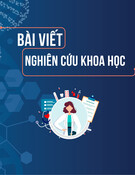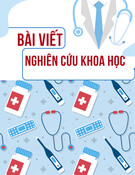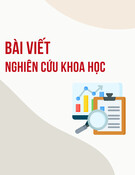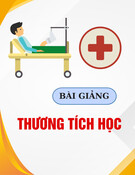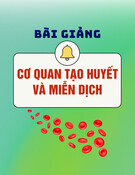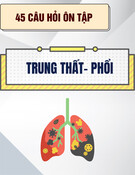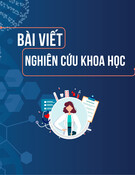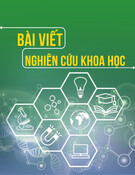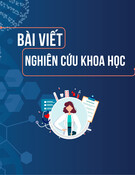
Can Tho Journal of Medicine and Pharmacy 10(7) (2024)
107
EVALUATION OF KNOWLEDGE AND FACTORS RELATED TO
ENTREPRENEURSHIP OF YOUNG PHARMACISTS
IN THE MEKONG DELTA IN 2023
Nguyen Thi Trang Dai1, Lam Ngoc Yen1, Luu Thi Nhu Y1,
Vo Pham Trinh Thu2, Tang Nghiep Minh2, Nguyen Phuc Hung1*
1Can Tho University of Medicine and Pharmacy
2Can Tho University
*Corresponding author: nphung@ctump.edu.vn
Received: 07/12/2023
Reviewed: 31/03/2024
Accepted: 06/05/2024
ABSTRACT
Background: The term “Entrepreneurship” refers to innovative, high-risk, and rapidly
expanding business ventures that frequently need a substantial cash source. Most of the initial
funding comes from individual savings or family’s financial support. The process of becoming an
entrepreneur starts with identifying an opportunity and ends with creating a plan to take advantage
of it. However, it has never been straightforward or simple to start a firm, particularly in the
pharmaceutical sector. In order to initiate and maintain a profitable business, pharmacists must
train themselves with business startup expertise. Objectives: To evaluate the knowledge and factors
affecting the entrepreneurship of young pharmacists in the Mekong Delta from May 2023 to
November 2023. Material and methods: To ascertain the viewpoints of 815 young pharmacists aged
from 20 to under 40, this study used a cross-sectional descriptive design and conducted interviews
with them, basing on the features of the research item, obtaining knowledge about entrepreneurship
and identify some relevant elements. Results: Women made up 69.1% of the young pharmacist
workforce, including the majority of college pharmacists (46.5%), university pharmacists (43.1%),
and those with master or doctoral degrees (10.4%). 80% were familiar with entrepreneurship, and
90.1% believed that, in order to launch a successful business, entrepreneurs had to have a thorough
understanding of the industry in which they planned to operate. 77.8% had high knowledge scores.
Regard the total of knowledge scores by characteristics groups, it has been clearly seen in the study
that the gender, economic, and educational variables had an impact on general knowledge
(p<0.05); in which the college pharmacist category (429.76), along with the rich and the well-off
(429.76) had the highest average rankings among the characteristic categories. Conclusions: The
majority of young pharmacists in the Mekong Delta were aware of and fairly knowledgeable about
entrepreneurship.
Keywords: entrepreneurship, startup information, Mekong Delta.
I. INTRODUCTION
Entrepreneurship is popularly a topic with different concerns from the people,
especially the surveyed young; however, at any age when starting a business,
businesspeople will encounter various issues. For the youngsters starting a business, it is
essential to have knowledge and understand the factors affect the start-up. However,
entrepreneurship-related knowledge and skills are the keys to enhance a range of health
services in the community and the hospital sectors. In the United States, pharmacies have
also adopted community services for improving patient medication adherence such as
medication management programs that allow pharmacists to advise patients about
medications [1]. In Vietnam, the proportion of higher education institutions tailoring
entrepreneurship as a mandatory or optional subject increased from 30% at the end of 2020





